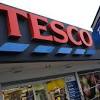Bank of England tipped to leave interest rates on hold; Shell profits drop – business live

Newsflash: The Bank of England has left UK interest rates unchanged, in a rare three-way split!
Bank Rate will remain at 5.25%, a 16-year high.
That will disappoint borrowers, such as mortgage holders, hoping to see a drop in borrowing costs today.
But it’s bang in line with City forecasts.
But, the decision is not unanimous … two members of the Bank’s Monetary Policy Committee preferred to increase Bank Rate by 0.25 percentage points, to 5.5%. One member preferred to reduce Bank Rate by 0.25 percentage points, to 5%.
The Bank says:
Six members (Andrew Bailey, Sarah Breeden, Ben Broadbent, Megan Greene, Huw Pill and Dave Ramsden) voted in favour of the proposition.
Three members voted against the proposition. Two members (Jonathan Haskel and Catherine L Mann) preferred to increase Bank Rate by 0.25 percentage points, to 5.5%. One member (Swati Dhingra) preferred to reduce Bank Rate by 0.25 percentage points, to 5%.
Q: Would the Bank of England feel comfortable holding interest rates on hold for longer, even if the US Federal Reserve and the European Central Bank both cut rates earlier?
Andrew Bailey smilingly replies that all central banks take decisions based on their domestic situation; that’s how they’ll justify whatever decisions they take.
Deputy governor Dave Ramsden weighs in too, pointing out that services inflation is lower in the US and eurozone.
Q: When inflation falls to 2% in the spring, as you expect, many people will declare victory in the battle against inflation. Would they be wrong?
Andrew Bailey says the Bank’s mandate is price stability – defined at 2% on a sustained basis.
So the Bank’s forecast that inflation falls to 2% in April-June, before bouncing up again, does not show sustained price stability.
But, it’s “good news” that inflation is coming down, he insists.
And he refuses to give any steer about what the Bank might do at its next meeting in seven week’s time; that meeting is ‘live’, and policymakers will look at all the data.
We don’t need to say inflation back at the 2% target before cutting interest rates, governor Andrew Bailey insists – just more confidence that it is heading there sustainably.
Q: What would it take for the Bank of England to cut rates? Lowest service sector inflation, more slack in the labour market, or a further fall in pay settlements?
These are exactly the indicators that have guided us over the last year, says deputy governor Ben Broadbent. They’ll remain just as important.
He adds that the Bank needs to have more confidence that inflation will fall and stay low, rather than better-than-expected “downside surprises” in the data.
Q: Are you worried that the government will ‘throw the kitchen sink’ in March’s budget, and create more problems for the Bank of England?
Andrew Bailey swerves any temptation to comment on tax and spending decisions, saying the Bank simply takes the government’s fiscal policy into account when it sets monetary policy.
Q: History suggests that most pay deals are done by April…. do you want to see how this year’s negotiations play out before deciding whether to cut rates?
Governor Bailey says the average weekly earnings index has fallen recently.
He points out that wages are set in markets, but indicates that the fall in inflation could ease the pressure to raise wages.
Bailey says inflation has been falling rapidly, that should be passed through into inflation expectations, and those expectations are then reflected into labour costs and services inflation.
Bailey insists he’s not making a “preaching point, at all” (having been criticised a couple of years ago for warning that pay rises could embed inflation). This is simply the mechanism you’d expect to happen.
Q: Fed chair Jerome Powell said yesterday he didn’t believe that working from home doesn’t boost productivity – do you agree?
Andrew Bailey says he’s not qualified to answer this one, as someone who comes into the office every day.
Q: The public want as clear guidance as possible about what is likely to happen next to interest rates. Is the Bank signalling that interest rates have probably peaked, and the next move is probably down?
Andrew Bailey repeats his earlier comment about the “good news” that inflation has fallen to 4%, and that the Bank has removed its earlier guidance that the next move in interest rates would probably be up.
The question has changed, the governor says, from how restrictive should the Bank be to how long it should maintain its restrictive stance.
That is the core question in our framework now, he insists.
Q: Can you bring inflation down to 2% sustainably without pushing up unemployment?
Bailey says the Bank’s latest forecast for unemployment is lower than it was in November.
Q: Cash-strapped homeowners and renters will want to know why you’re not acting now, and cutting interest rates. Are you saying that things will get worse later in the year?
Andrew Bailey says he very much understands the situation faced by those people.
And he says the Bank has two messages:
1) It needs to get inflation down to target, and keep it there on a sustained basis. Although inflation is seen rising somewhat later this year, it’s not heading back to 10% (the 40-year peak in 2022).
2) The question it faces now is how long to maintain the current stance.
Bailey says:
We will not maintain it for any longer than we need to do to achieve the objective of inflation being at 2% at a sustained basis.
Keeping inflation at 2% is the best thing we can do for households, the governor adds.
Q: Given the stickiness of services inflation, will the ‘last mile’ of bringing inflation down be the hardest part of the battle?
Deputy governor Ben Broadbent explains that this ‘last mile’ of inflation is to do with tackling stickier domestic inflation, rather than the impact of imported energy prices.


 United Kingdom
United Kingdom Argentina
Argentina  Australia
Australia  Austria
Austria  Brazil
Brazil  Canada
Canada  Germany
Germany  Ireland
Ireland  Italy
Italy  Malaysia
Malaysia  Mexico
Mexico  New Zealand
New Zealand  Poland
Poland  South Africa
South Africa  United States
United States 
























